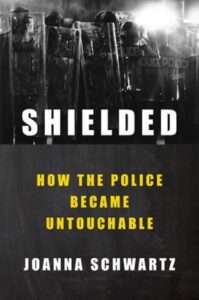The Volokh Conspiracy
Mostly law professors | Sometimes contrarian | Often libertarian | Always independent
Joanna Schwartz's "Shielded: How the Police Became Untouchable"
An important and compelling new book on qualified immunity and other obstacles to holding law enforcement officers accountable for rights violations.

The last few years have seen increased attention to the ways that qualified immunity and other legal doctrines and structural features of the criminal justice system protect law enforcement officers who violate citizens' rights, often even those who have engaged in very egregious abuses. UCLA law Professor Joanna Schwartz is probably the nation's leading expert on this subject and her new book Shielded: How the Police Became Untouchable is must reading for those interested in the topic. Here is the publisher's description:
In recent years, the high-profile murders of George Floyd, Breonna Taylor, and so many others have brought much-needed attention to the pervasiveness of police misconduct. Yet it remains nearly impossible to hold police accountable for abuses of power—the decisions of the Supreme Court, state and local governments, and policy makers have, over decades, made the police all but untouchable.
In Shielded, University of California, Los Angeles, law professor Joanna Schwartz exposes the myriad ways in which our legal system protects police at all costs, with insightful analyses about subjects ranging from qualified immunity to no-knock warrants. The product of more than two decades of advocacy and research, Shielded is a timely and necessary investigation into why civil rights litigation so rarely leads to justice or prevents future police misconduct. Weaving powerful true stories of people seeking restitution for violated rights, cutting across race, gender, criminal history, tax bracket, and zip code, Schwartz paints a compelling picture of the human cost of our failing criminal justice system, bringing clarity to a problem that is widely known but little understood. Shielded is a masterful work of immediate and enduring consequence, revealing what tragically familiar calls for "justice" truly entail.
The Balkinization website recently posted a symposium on the book, with commentary by eight prominent legal scholars, and Schwartz's response to their comments and criticisms.
Schwartz's book comes at a time when reform efforts have largely gone stagnant. In the aftermath of the death of George Floyd at the hands of abusive police in 2020, there was hope that qualified immunity might be abolished by the Supreme Court or through legislation. But, while some progress was made in a few states, it has stalled as public attention moved on to other issues, and rising crime rates make it politically more difficult to curb police in any way. Most states still have broad QI doctrines.
There is a similar story at the Supreme Court. While the Court has denied law enforcement officers quality immunity in a few extreme cases, there does not seem to be a majority of justices willing to abolish this judicially created doctrine entirely, or even to severely restrict it. The unusual coalition of justices Sonia Sotomayor and Clarence Thomas does support major constraints on QI. But, so far at least, they have not found the three additional votes they need to make it happen. Some other observers are more optimistic about the Supreme Court on this issue, than I am. Time will tell.
Curbing police abuses is an issue that unites most progressives and libertarians, and even some conservatives. But it is hard to accomplish because of a combination of long-entrenched judicial precedent, structural flaws in the legal system ( (many of them brilliantly dissected in Schwartz's book), powerful interest groups, and rising public fears of crime.
Hopefully, Shielded will help rekindle interest in these important issues. It could even give a boost to otherwise stalled reform efforts.


Show Comments (20)